In this article:
Urticaria is itchy rashes that can be due to many reasons, including allergic reactions, physical triggers, and even an underlying health issue such as rheumatoid arthritis or viral infection. (1)
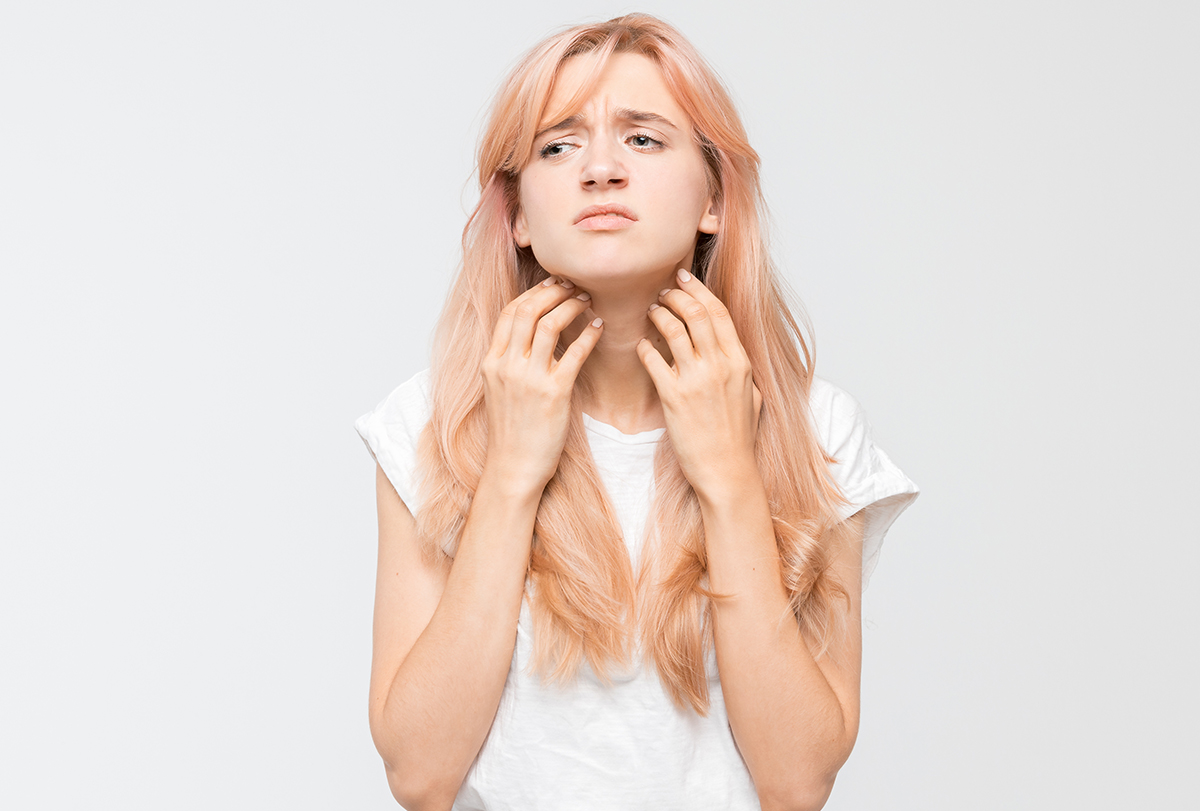
Urticaria is also known as hives, and some people may confuse it for a rash because of similarities in appearances of different types of rash and rashes caused due to hives, which are generally itchy but general rashes are not usually itchy. Many people experience it at some point in their lives.
Urticaria can be chronic, which means lasting for a very long time, or acute, which means lasting for 2 months or less. Chronic urticaria can be due to an autoimmune disease. In such cases, the person can have hives for years and months on end. Food allergies are quite a common reason for urticaria. (1)
Urticaria and angioedema are well-known allergic reactions. Urticaria is self-limiting in nature and occurs rapidly. It is limited to the superficial part of the skin. Angioedema or swelling, on the other hand, can move to additional layers of the skin and remains for a longer period.
Urticaria and angioedema can happen either at the same time or independently of each other. If your angioedema with urticaria is recurring while you have a family history of angioedema, then it can be hereditary. (1)(2)
Natural Ways to Treat and Manage Urticaria
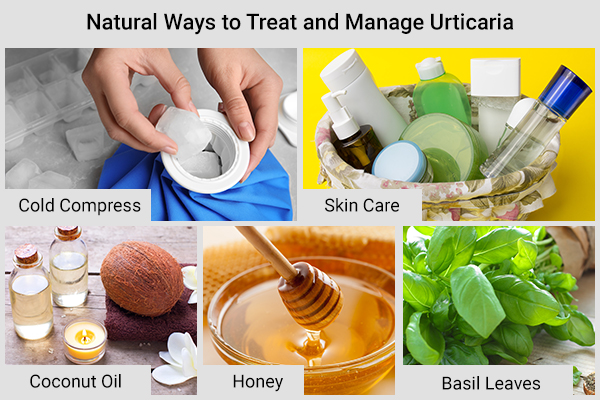
Here are some ways to manage and deal with urticaria naturally.
1. Apply a cold compress
Taking a cold bath or applying a cold compress to the affected area can help relieve urticaria.
Itching from urticaria can make you feel very uncomfortable, and according to the Asthma and Allergy Foundation of America, a cold compress helps soothe the itchiness without aggravating the hives. It also keeps you from scratching the hives.
You can place a clean towel dipped in cold water or an ice bag on the hives.
2. Follow the right skin care
Avoid using aggressive or harsh soaps on the skin as these can aggravate hives. Use soothing creams instead. Moreover, choose skin care products, soaps, and detergents that are mild and do not have fragrance. (3)
3. Massage with coconut oil
Coconut oil is known for its anti-inflammatory and antioxidant properties, which can be very helpful in managing hives. Massaging with coconut oil soothes the skin and, therefore, provides you relief from hives.
A coconut oil massage is also great for getting rid of skin irritation that arises from chronic urticaria. (4)
4. Apply honey
Honey has been used as a topical treatment for allergies including urticaria. This is because it has anti-inflammatory properties that soothe the skin and reduce the swelling associated with hives.
So, apply honey to the affected area to manage the situation. (5)
5. Use basil leaves
Basil leaves are very famous in the world of herbal medicine. Basil has natural histamine-blocking action, which is helpful in reducing hives and skin irritation associated with it.
Basil leaves also have antioxidant and anti-inflammatory compounds including linalool and eugenol, which promote healing and soothing of the skin. (6)
Self-Care Tips to Manage Urticaria
Here are some self-care measures that are helpful in managing urticaria.
1. Avoid allergens
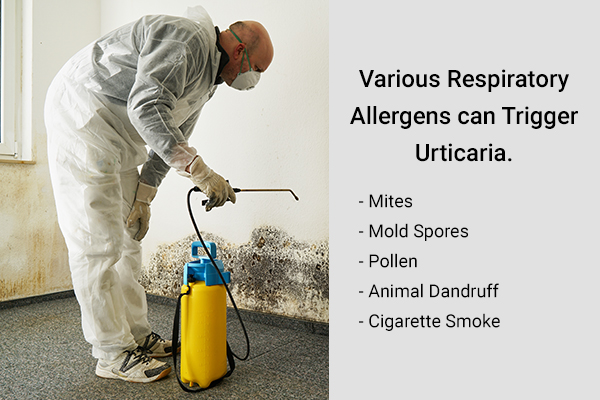
Various respiratory allergens can trigger urticaria. Urticaria caused by respiratory allergens usually occurs immediately after contact. These allergens include: (7)
- Mites
- Mold spores
- Pollen
- Animal dandruff
- Cigarette smoke
2. Avoid scratching
Distracting yourself from hives is also important to make sure that you don’t constantly keep itching, which is only going to make the condition worse. Never rub the skin or scratch it if you have hives. (7)(8)
3. Dress right
Make sure that you are dressed in clothes that are not too tight. Wear clothes that fit loosely to relieve yourself from the discomfort of hives that occur due to pressure.
Choosing light cotton-based closing is the best option. (9)
4. Check the temperature
Avoid sitting in a very hot room by using a fan or turning the air conditioner on because overheating can lead to hives. If your body temperature feels high, you can take a cold shower. (10)
5. Avoid too much sun exposure
Avoid going out in the sun too much because sun exposure is another trigger for hives. (10)
6. Implement dietary modifications
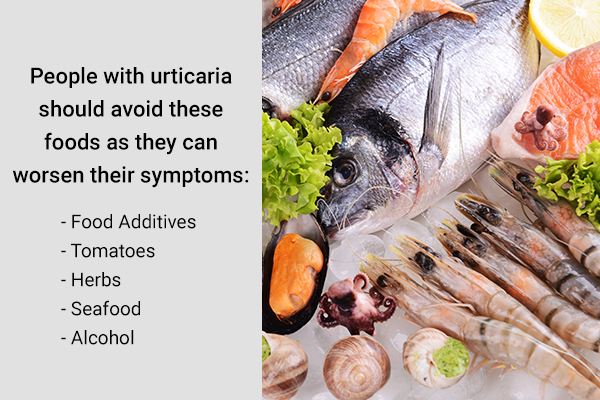
If you have food allergies, stay away from food allergens as any kind of food allergy can lead to hives. According to a study, a diet free of pseudo allergens (A pseudoallergy is a condition named for its similar presentation to a true allergy, though due to different causes) and low histamine levels can result in partial remission of urticaria.
Also avoiding foods that worsen the symptoms of urticaria may be beneficial. These include: (11)
- Food additives
- Tomatoes
- Herbs
- Seafood
- Alcohol
Urticaria caused by food is usually seen 1–2 hours after ingestion. Food-related urticarial rashes are more common in children. Food encountered as causes of urticaria include: (7)(12)
- Nuts
- Eggs
- Fish
- Mushrooms
- Spices
7. Limit stress
Another common trigger of hives is stress. So, managing stress is an important part of preventing hives.
You can do so by practicing meditation, doing physical activity, or going for stress counseling. Other psychogenic factors such as sadness and depression may also aggravate the preexisting urticaria or induce urticaria. (13)(7)
In many individuals, urticaria is caused by medicines that most commonly include: (1)
- Salicylates
- Codeine
- Antibiotics
- ACE inhibitors
Experts say that allergic vasculitis can be caused by the use of:
- Sulfonamides
- Indomethacin
- Oral contraceptives
Symptoms of Urticaria
The good news is that urticaria is not communicable, but it might sometimes accompany a contagious infection.
Urticaria by itself can be managed, but it becomes life-threatening if it escalates to anaphylaxis. To avoid this, you should look out for the following symptoms: (14)
- Swelling of the face
- Throat ache
- Increased heartbeat
- Lightheadedness
- Unconsciousness
- Swelling in the tongue
Immediately seek medical help if you experience these symptoms.
Clinical features of urticaria
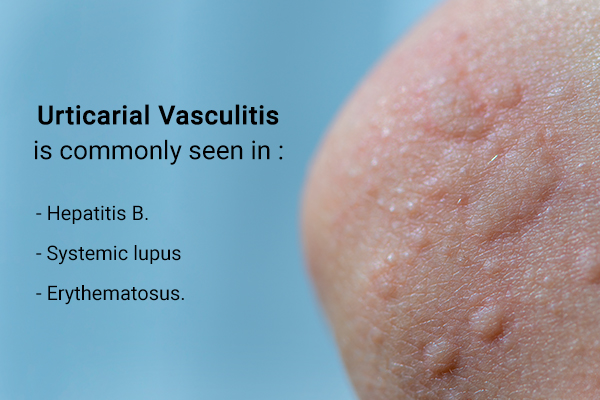
Here are some important things about urticaria you need to know.
How long does an individual lesion last?
If your lesion lasts for less than a day, it is considered urticaria, but if it is there for more than 24 hours, it is considered urticarial vasculitis.
Urticarial vasculitis is commonly seen in:
- Hepatitis B
- Systemic lupus erythematosus
In urticaria, itchy wheals (swollen marks) develop, sometimes accompanied by angioedema, whereas in allergic vasculitis, painful and palpable spots (noticeable spots that can be touched or felt) develop, followed by necrotic ulcers.
Necrosis is the death of cells in living tissue; it is almost always detrimental to the health of the patient and can be fatal. It leads to a buildup of dead tissue and cell debris.
Urticarial vasculitis is distinguished by inflammation of the blood vessels, which can prohibit blood flow, thereby harming vital organs and tissues. (15)
How long has the condition been present?
If you suffer from urticaria for less than 6 weeks, it is considered acute urticaria, but if the condition is present for more than 6 weeks, it is known as chronic urticaria. (7)
Treatment for Urticaria
Acute urticaria can be treated based on the underlying cause with medicines that include: (7)(16)
- Anti-allergic medicine such as antihistamines (for example, loratadine and pseudoephedrine, cetirizine, or fexofenadine)
- Steroids that are applied topically to the affected area such as hydrocortisone or Neosporin
- Antiseptic lotions
- Soothing cosmetic products such as creams and lotions
Investigational Methods to Check for Urticaria
The investigational approach for this problem includes: (1)
- A complete blood count to check for the eosinophil count, which is evaluated to diagnose parasites
- Evaluation of the erythrocyte sedimentation rate (ESR) since it is increased in the case of vasculitis
- Liver function tests (LFT) and kidney function tests (KFT) to rule out any other disorder
- Total immunoglobulin [IgE] and specific IgE tests to look for possible allergens such as shellfish or peanuts
Additional Tips to Deal With Urticaria
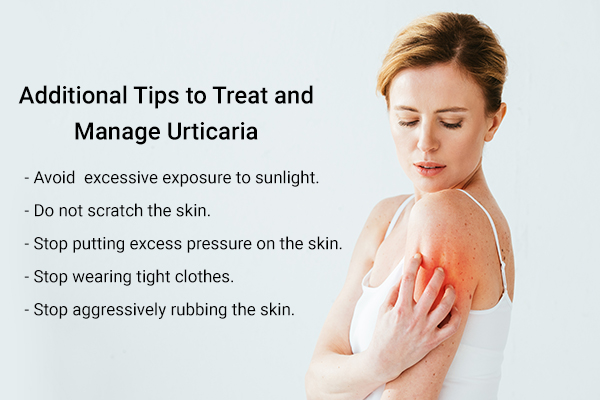
Hives can be due to physical triggers, (10)(7) so avoid such triggers:
- Avoid excessive exposure to sunlight.
- Do not scratch or aggressively rub your skin.
- Stop putting excessive pressure on the skin.
- Refrain from wearing tight clothes.
- Avoid a very hot body temperature.
- Do not stress yourself.
- Avoid extreme exposure to UV light.
Complications of Urticaria
Urticaria is often accompanied by angioedema, which may affect the upper respiratory tract and may result in fatal laryngeal edema. Gastrointestinal involvement may further lead to severe abdominal colic, which would require surgery. (1)
When to See a Doctor
If you have severe hives that last for more than a few days, you should seek professional help. Hives caused by an allergic reaction that leads to dizziness, troubled breathing, and swelling of the tongue also require emergency medical care.
Most-Asked Questions About Urticaria (Hives)
What food commonly causes allergies that can lead to hives?
Urticaria due to an allergic attack can arise from consuming the following foods: (11)
- Eggs
- Seafood
- Nuts
- Kiwi
- Banana
- Mango
What are the common signs of urticaria?
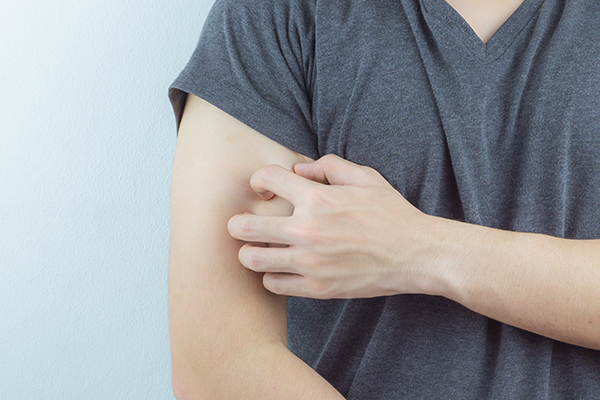
Urticaria can be characterized by the following signs and symptoms:
- Skin lesions
- Bumps on the skin
- Itchiness
- Skin redness
- Lines on the skin
- Blotches or spots on the skin
If you experience these symptoms, go to your healthcare provider for medical assistance. (17)
After how long do hives appear after coming in contact with an allergen?
Urticaria symptoms can start a few minutes after exposure to an allergen or physical strain such as in the case of food allergies, but they can also take a day or two in other cases. (11)
Where do hives appear on the body?
Urticaria can occur anywhere on the body, but the most common parts where people experience hives include: (17)
- Legs
- Arms
- Face
Final Word
Hives can be a source of immense discomfort. They can be painful and itchy, and they often may leave a bruise on the skin. The perfect way to diagnose your condition and manage your symptoms is to talk to a healthcare professional.
- Was this article helpful?
- YES, THANKS!NOT REALLY


